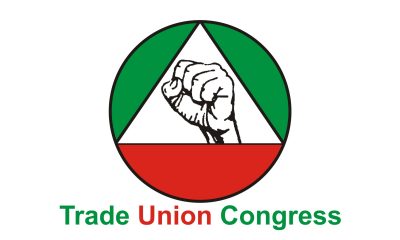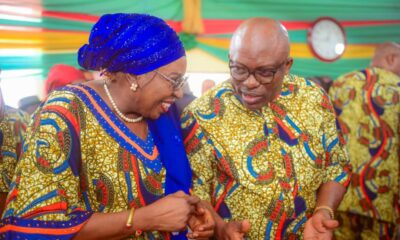Niger Delta
Bayelsa Has Done Well At 24 -NLC Chairman

The Chairman of Nigeria Labour Congress (NLC),Bayelsa State chapter, Comrade John Ndiomu, says the state is doing well since after its creation 24 years ago.
Ndiomu said that but for the creation of the state, its people and communities would have hardly had chances of development,pointing out that the Bayelsa State of today was the most under- developed part of the old Rivers State.
The labour leader who also bared his mind on the recently celebrated 60th Independence of Nigeria noted that it was as a result of the independence of the country that additional region was created, saying this later dawned on the government to create states for rapid socio-economic transformation where the old Rivers State was amongst those created.
Ndiomu stated that with the need to attract faster development, the present Bayelsa State was carved out of the old Rivers State, bringing the level of development presently seen in the state to being.
He hinted that through concerted efforts by successive administrations in the state,Yenagoa which hitherto was one of the remotest areas of the country now has most of the trappings of an urban centre, noting that with the needed infrastructure put in place, the state would be competing favourably with its peers in the nation.
He commended Governor Douye Diri for his labour- friendly policies, harping that arrears owed workers by successive administrations in the state civil service were gradually being cleared by the current government.
He enjoined workers to continue having faith in the leadership of the NLC,just as he said though it is not yet Uhuru labour under his stewardship has recorded its share of achievements within his first and second tenures.
The two term labour leader urged employed and unemployed Bayelsans and Nigerians to remain at peace with one another, maintaining that the recently celebrated twin anniversaries of the nation’s Independence and State creation were a time for sober reflection on the past, present and future of the nation and state, respectively.
By: Ariwera Ibibo-Howells, Yenagoa.
Niger Delta
NDDC Begins N50,000 Monthly Payment To 10,000 N’Delta Youths

The Niger Delta Development Commission (NDDC) has begun the payment of N50,000 monthly stipends to 10,000 indigenous youths from the Niger Delta under its Youths Internship Scheme.
The Director of Corporate Affairs at the NDDC, Mrs Seledi Thompson-Wakama, disclosed this to journalists in Port Harcourt, Rivers State capital, yesterday.
She explained that the beneficiaries would undergo practical, hands-on training across the various organisations for 12 months to develop critical skills.
Recall that during the inauguration of the scheme on July 31, 2024, Senate President, Godswill Akpabio, had announced the Federal Government’s approval of a N50,000 monthly stipend for the trainees.
According to Thompson-Wakama, the commission has successfully completed the selection process and has begun placing trainees in organisations to gain practical experience.
“Consequently, with the completion of these phases, the payment of the monthly stipends has also commenced,” she announced.
She revealed that the 10,000 beneficiaries were transparently selected from over 3.2 million youths who registered for the empowerment programme.
“This unprecedented response highlights the immense potential and aspirations of our youths to improve themselves.
“NDDC remains steadfast in ensuring this life-changing opportunity reaches the most deserving candidates, creating a lasting impact and paving the way for a brighter future,” she stated.
Thompson-Wakama explained that the scheme had enabled the commission to collate essential data, including the qualifications, skills, interests, needs, and employment status of the youths in the region.
The data, she explained, would guide the commission in designing programmes tailored to address the unique challenges faced by young people.
She disclosed that the NDDC partnered with KPMG, a global audit and consultancy firm, to enhance the commission’s corporate governance framework.
“KPMG has produced a Governance Advisory Report that will serve as a tool to support the commission’s transition from a transaction-based to a transformation-focussed policy,” Thompson-Wakama added.
The director commended the youths for their patience and cooperation during the selection process for the scheme.
Niger Delta
Oborevwori Tasks Public Officers On Selflessness

Niger Delta
C’ River Committed To Mangrove Restoration – Gov

-
Niger Delta4 days ago
NACAT Inaugurates South-South Office In A’Ibom Against Corruption
-
Sports4 days ago
AFCON: Eguavoen, Emenike predict S’ Eagles’ chances
-
Rivers2 days ago
Appreciate God, Elder Statesman Urges Nigerians
-
Business4 days ago
Bayelsa Recommits To Infrastructure, Sectoral Dev … Rakes In N227.185b From IGR
-

 Featured2 days ago
Featured2 days agoTUC Opposes FG’s Proposed Toll Gate On Federal Roads, Rejects Electricity Tariff Hike
-

 News2 days ago
News2 days agoBe Consoled, God Who Gives, Also Takes, Fubara Tells Principal Secretary
-

 News4 days ago
News4 days agoS’South Deputy Govs Pay Condolence Visit To A’Ibom Colleague
-

 Niger Delta4 days ago
Niger Delta4 days agoHYPREP Presents Scholarship Grants To 300 Ogoni Postgraduate Students

